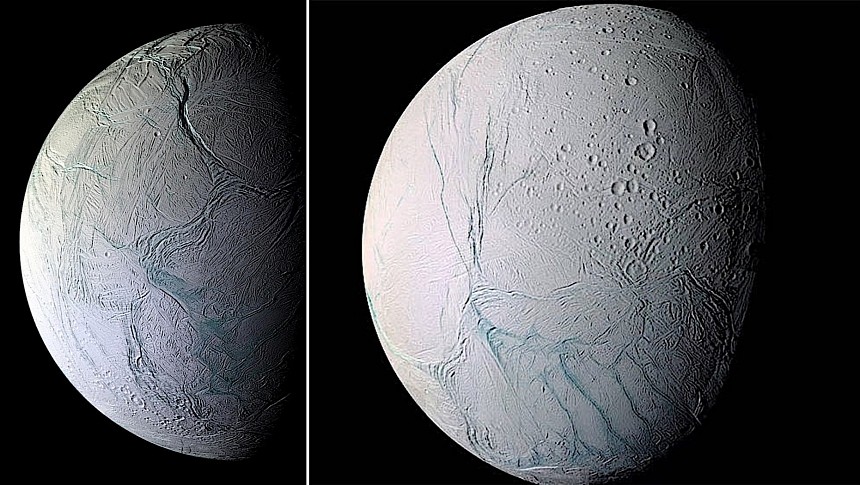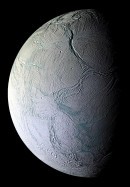Enceladus is one of the some 290 traditional moons we know to exist in our solar system. Small in size, being about as wide as the state of Arizona, it spins around gas giant Saturn and is responsible for feeding one of the planet's known rings. And Enceladus is now at the center of attention thanks to an incredible discovery.
The moon has been the subject of study during the Cassini mission, which ended in 2017 with the namesake spacecraft plunging into Saturn's atmosphere. Before doing that, though, it returned years' worth of science from that distant place in our solar system.
The data sent back by Cassini has been the subject of study for teams of scientists around the world, and we've learned a lot of interesting things about both the planet and its moons. As far as Enceladus is concerned, we already know the place has a subsurface water ocean.
The moon's processes make some of this water erupt as geysers, eventually reaching the space above and forming an icy particles plume. We know the plume to contain minerals and organic compounds, including the ones needed to form amino acids, but this week a much more important element was confirmed: phosphorus.
Phosphorus is extremely important for the emergence of life as we know it, as it not only helps a lot of biological processes take place, but is also a building block for DNA. Here on Earth, we can find it in bones, cell membranes, and even plankton.
In other words, where there is no phosphorus, there is no life as we know it. Enceladus, it seems, has plenty of it floating around in its subsurface ocean. The international team from the U.S., Europe and Japan that looked at Cassini data to find the element claims this is the first time phosphorus was discovered on another world, and even published a paper on the subject in Nature. In fact, data shows concentrations of bound phosphorus seem to be at least 100 times higher than on our own planet.
One of the investigators behind the study, Christopher Glein from the Southwest Research Institute in San Antonio, Texas, says the discovery is nothing short of stunning for astrobiology. That's because, even if it's not actual proof of alien life, the presence of phosphorus in such large amounts is a strong sign life could potentially exist in Enceladus' ocean.
NASA, which was not directly involved in the study, reacted to news through Cassini's project scientist Linda Spilker, who said that what the now defunct spacecraft helped uncover might very well inspire other missions to that region of our solar system.
One can only hope that it will happen sooner rather than later, and we will finally get a better picture of what's out there.
The data sent back by Cassini has been the subject of study for teams of scientists around the world, and we've learned a lot of interesting things about both the planet and its moons. As far as Enceladus is concerned, we already know the place has a subsurface water ocean.
The moon's processes make some of this water erupt as geysers, eventually reaching the space above and forming an icy particles plume. We know the plume to contain minerals and organic compounds, including the ones needed to form amino acids, but this week a much more important element was confirmed: phosphorus.
Phosphorus is extremely important for the emergence of life as we know it, as it not only helps a lot of biological processes take place, but is also a building block for DNA. Here on Earth, we can find it in bones, cell membranes, and even plankton.
In other words, where there is no phosphorus, there is no life as we know it. Enceladus, it seems, has plenty of it floating around in its subsurface ocean. The international team from the U.S., Europe and Japan that looked at Cassini data to find the element claims this is the first time phosphorus was discovered on another world, and even published a paper on the subject in Nature. In fact, data shows concentrations of bound phosphorus seem to be at least 100 times higher than on our own planet.
One of the investigators behind the study, Christopher Glein from the Southwest Research Institute in San Antonio, Texas, says the discovery is nothing short of stunning for astrobiology. That's because, even if it's not actual proof of alien life, the presence of phosphorus in such large amounts is a strong sign life could potentially exist in Enceladus' ocean.
NASA, which was not directly involved in the study, reacted to news through Cassini's project scientist Linda Spilker, who said that what the now defunct spacecraft helped uncover might very well inspire other missions to that region of our solar system.
One can only hope that it will happen sooner rather than later, and we will finally get a better picture of what's out there.






